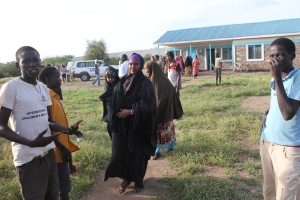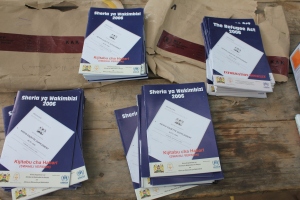The Refugee Consortium of Kenya (RCK) organized legal awareness forums in the season of the 16 Days of Gender Activism in Kakuma.
The Refugee Consortium of Kenya (RCK) is a national Non-Governmental Organization that was established in 1998 to promote and protect the rights of refugees and asylum seekers in Kenya and across East Africa.
The RCK later moved to refugee camps, where they provide pro bono legal advice for refugees. RCK moved to Kakuma refugee camp in 2010, since when they have been giving refugees advice and counseling during the period of the Refugee Status Determination (RSD) process.
In addition, refugees often fall victim to crimes committed by individuals due to ignorance and not understanding the consequences of crimes they commit outside their countries of origin. Over decades refugee individuals or groups have experienced court actions and distress due to lack of legal representation and negative court decisions. The situation has now improved thanks to the actions of the RCK.
The organization is dedicated to advocating for the rights of refugees who have been warehoused since they moved into camps. It has also led in legal training for Agency staff, the Kenya police force in humanitarian refugee operations, the refugee leaders and members of the refugee communities in accordance with the laws and the Refugee Act.

This year’s forums were set to target all the nine zones in the camp settlements. In each zone, day of awareness forums were conducted in accordance with the needs of the community, determined by liaison with refugee zonal leaders. In some zones a specific Sexual and Gender Based Violence (SGBV) is more evident compared to other zones of the camp where domestic violence, drug abuse or harmful cultural practices frequently crop up.
The camp residents have lived within the close quarters which have become their homes for decades. Despite the prolonged stay, refugees are not informed about their rights, duties and obligations. Through provision of right to information the RCK fills this gap.
“These forums will target largely the new arrivals among others to enlighten them on the laws as per the Refugee Act, their rights and obligations,” Martin Pepela – Programme manager RCK Kakuma – told Kanere.
16 Days of Gender Activism
The 16 Days of Gender Activism is an international campaign that starts on the 25th November, which is an International Day of Elimination of Violence against Women, and ends on the 10th December, Human Rights Day.
During the course of the 16 Days, the campaign target is to raise awareness on gender based violence as a human rights issue in refugee camps, at regional and international level. The theme for this year was: “from peace in the home to peace in the world: Let’s challenge militarism and end violence against women” in 2013.
There are rampant offences of Sexual and Gender Based Violence (SGBV) and domestic violence that frequently take place within the refugee camps settlements. In Kakuma camp many cases of SGBV are committed by boys and men on girls or women. However, over the years, the rate of gender based crimes has reduced, following proper protection mechanisms and the enhancement of law in the camps to cater for the safety and wellbeing of refugees as they live in porous camps.
Awareness sessions
All the nine zones in the camp had at least one day of awareness forums. During these intensified occasions the refugees are equipped with a real knowledge on refugee rights as laid down in the Refugee Act.

Refugees enjoyed the lively discussions where most of their questions got answered. Printed copies of the Kenyan Refugee Act of 2006 were handed out to all the participants who attended particular forums in the refugee settlement. The Refugee Act booklets have been translated into the four languages which are most commonly spoken in Kakuma: Kiswahili, English, Somali, and Oromo language.
In almost all the forums, participants turned up in large numbers. In each forum the target for actual participants is 100, but in many stations, participants were more than double the set number. In Kakuma 1 Zone 2 and Kakuma 3, high numbers turned up and despite the lack of space people were allowed in to benefit from forum discussions from side to side of the hall.
“If there are possibilities, we would like the RCK to provided more trainings next year,” a South Sudanese refugee leader appealed.
In earlier years, refugees had no pro bono lawyers as compared to the three years since the RCK have begun advocacy and legal aid for Kakuma camp residents. “Refugee communities tremendously thanked your advocacy role and provision to accompany and protect refugee rights in Kenya,” a Congolese Zone 3 leader recognized.
According to the refugee communities, RCK’s work in Kakuma has had a positive impact on refugee rights while upholding democratic governance through its advocacy role and unprejudiced approach inside the camp.
